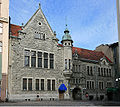
National Romantic style
This article needs additional citations for verification. (January 2020) |

The National Romantic style was a Nordic architectural style that was part of the National Romantic movement during the late 19th and early 20th centuries. It is often considered to be a form of Art Nouveau.

The National Romantic style spread across Denmark, Norway, Sweden, Finland, Estonia, and Latvia, as well as Russia, where it also appeared as Russian Revival architecture. Unlike some nostalgic Gothic Revival style architecture in some countries, Romantic architecture often expressed progressive social and political ideals, through reformed domestic architecture.[1]

Nordic designers turned to early medieval architecture and even prehistoric precedents to construct a style appropriate to the perceived character of people. The style can be seen as a reaction to industrialism and an expression of the same "Dream of the North" Romantic nationalism that gave impetus to renewed interest in the study of the history of Scandinavia, along with the rediscovery of the eddas and sagas of Nordic mythology.

Examples
- Bergen Station (Bergen stasjon) (1913, Norway)
- Copenhagen City Hall (Københavns Rådhus) (1905, Denmark)
- Dresden Saxon District Court [de] (Königlich-Sächsisches Landgericht) (1902, Germany)
- Finnish National Theatre (Suomen Kansallisteatteri) (1902, Finland)
- Frogner Church (Frogner kirke) (1907, Norway)
- Holdre Manor (Holdre mõis) (1910, Estonia)
- National Museum of Finland (Suomen Kansallismuseo) (1905, Finland)
- Norwegian Institute of Technology (Norges tekniske høgskole) (1910, Norway)
- Pohjola Insurance building (1901, Finland)
- Polytechnic Students' Union or Sampo Building (1903, Finland)
- Röhss Museum (Röhsska konstslöjdsmuseet) (1916, Sweden)
- Stockholm City Hall (Stockholms stadshus) (1923, Sweden)
- Stockholm Court House (Stockholms Rådhus) (1915, Sweden)
- Taagepera Castle (Taagepera mõis) (1912, Estonia)
- Tarvaspää, (1913, Finland) the house and studio built for himself by Finnish painter Akseli Gallen-Kallela
- Tolstoy House (Толстовский дом) (1912, Russia)
- Church of the Epiphany (Uppenbarelsekyrkan) (1913, Sweden)
- Vålerenga Church (Vålerenga kirke) (1902, Norway)
- Saint Thérèse of the Child Jesus Church (Parròquia de Santa Teresa del Nen Jesús [ca]) (1932, Barcelona)
Sweden
Finland
-
Detail of Finnish National Theatre facade
-
Nylands Nation, Student Nation of Helsinki University
-
Hollola Municipal House
-
Alexanterinkatu Facade of Pohjola Insurance building, 1901.
-
Kallio Church, Helsinki
-
Nilsiä Church, Northern Savonia
Estonia
-
Holdre Manor
Denmark
Russia
-
Putilova house (The Owl House)
-
Melzer Revenue house
-
Traynin hoyse
-
Basseynaya Community of Apartment Owners buildings
-
Bernstein house
-
Basser house
-
Zazersky house
-
Markozov house
-
Barsova house
-
Sagalov house
-
Schmidt house
-
House of the Latvian Church
-
Bazhanov house
-
Vollenweider house
-
Shcherbov Estate Museum
-
Shrine of Our Lady of Lourdes
See also
References
- ^ Barbara Miller Lane, National Romanticism and Modern Architecture in Germany and the Scandinavian Countries (New York: Cambridge University Press), 2000:10.
External links
See what we do next...
OR
By submitting your email or phone number, you're giving mschf permission to send you email and/or recurring marketing texts. Data rates may apply. Text stop to cancel, help for help.
Success: You're subscribed now !









































![Lidval house [ru]](http://upload.wikimedia.org/wikipedia/commons/thumb/1/12/Lidval_House_1.jpg/90px-Lidval_House_1.jpg)
